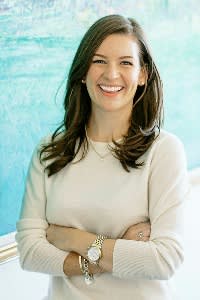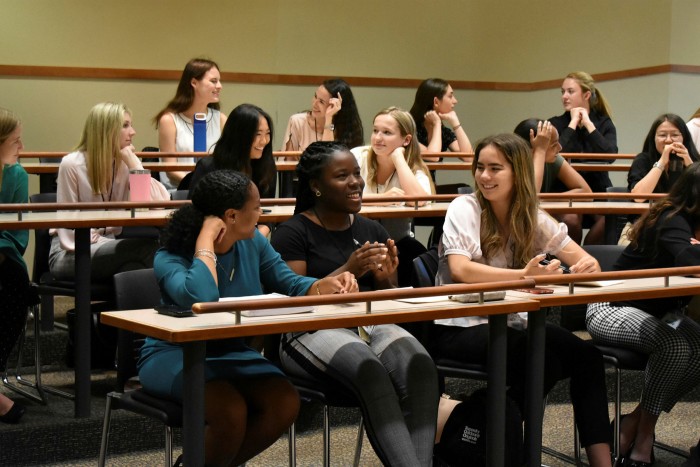Business schools push to help more women into finance
Kathy Matsui’s new world venture cash fund drew headlines past month for being the very first of its sort in Japan to aim on environmental, social and governance principles.
But the news was also important for an additional purpose. Matsui, who still left financial investment lender Goldman Sachs in Japan past calendar year and is regarded for coining the term “womenomics”, is a woman at the helm of an all-female management team — a rarity in the male-dominated finance market.
Enterprise universities are attempting to adjust this. To raise the very low number of ladies in senior finance roles, some universities are on a drive to assist dismantle the limitations to their progression. They are attempting a assortment of methods — ranging from new curriculum layout to on-campus and alumni networks.
For numerous, the very first obstacle is to persuade youthful ladies that occupations in this subject are welcoming and worthwhile. “A lot of it stems from misinformation about what the world of finance essentially is,” suggests Haley Parrin, who lately graduated from UNC Kenan-Flagler Enterprise College. She was the very first female president of the school’s Financial investment Banking Club, which helps MBA learners prepare for doing work in finance.

She argues that work in the market are generally mis-characterised as number crunching though, in reality, the function calls for strategic pondering. Parrin labored in small business assessment and consulting before starting off her MBA course.
“What goes on over and outside of [number-crunching] is far extra crucial than just receiving the quantities ideal,” suggests Parrin, who will be joining financial investment lender Morgan Stanley in July. “That ability established is a little something a lot of ladies have to give but don’t know how to use to the economic companies world.”
Katherine Jollon Colsher, chief government of Girls Who Spend, a non-financial gain organisation doing work to raise the number of ladies in senior asset administration roles, agrees. “It’s a job that is not generally understood,” she suggests. “People chat about being a lawyer, a health practitioner or a trainer — but less so about being a portfolio manager.”

But though perceptions are shifting, the thought of male-only boardrooms and lone female analysts persists in the well-known creativity, suggests Kathy Harvey, associate dean for diploma programmes at the University of Oxford’s Saïd Business College. “It requires numerous decades to adjust society and expectations.”
She argues that small business universities, as educators of potential finance leaders, are well positioned to accelerate a change in society and expectations. Their position incorporates supplying youthful ladies a place to look into their upcoming occupations with “a perception of self esteem and a perception that they genuinely can go anywhere they want to”.
Jennifer Bethel, a finance professor at Babson University in the US, suggests universities can also assist “normalise” the presence of ladies in finance. Some fifty for each cent of Babson’s finance professors are ladies, she adds. “Thirty decades in the past, you didn’t have ladies finance professors and now you have a lot of them,” she suggests.
Even a little adjust — she phone calls it a “one-inch deep” change — can make a variation. One particular case in point she offers is a scenario analyze protagonist owning a female name. “That’s a action forward,” she suggests. “But then it’s about getting [serious cases on] firms that are owned and operated by ladies.”
Enterprise universities can also call on female alumni doing work in finance to deliver other senior ladies in the market into classes.
Saïd’s non-public equity elective classes have experimented with to do just that, suggests Harvey. “[It] improvements the environment in the home and the mother nature of expectations.”
An uphill battle
In the United kingdom, ladies hold 17 for each cent of senior roles in the economic companies sector, a proportion that has scarcely changed because 2005, in accordance to the Fiscal Conduct Authority, the industry regulator. In the US, in accordance to Morningstar analysis, at the conclude of 2019 just fourteen for each cent of fund administrators were ladies — a figure that had not changed because 2000.
These measures show up to be paying off: the proportion of the school’s female graduates likely into finance roles rose from 37 for each cent in the class of 2018-2019 to 47 for each cent in the class of 2019-2020.
Having said that, Bethel argues that raising consciousness of finance as a promising job for ladies should really begin though they are young adults however at university.
She cites the Fiscal Wellness Method, a local community provider programme run by the Babson Finance Affiliation. Its users — two-thirds of whom are ladies, she suggests — train fundamental own finance competencies at universities in underprivileged communities.
Additional stories from this report
“You have these awesome ladies in entrance of these large-university young children,” suggests Bethel, who is also co-founder of the Babson Fiscal Literacy Challenge. “Creating this chain is vital, so they can visualize what [the finance sector] is,” she suggests.
Meanwhile, the increase of ESG-centered investing is assisting to draw in and raise the number of female finance executives.
In between 2015 and 2020, for case in point, 44 for each cent of the senior ESG positions that Acre Resources, a expert government research consultancy, assisted to fill went to ladies.
“Already ladies are connecting to sustainability — and now there is a finance lens with that,” suggests Bethel.
